Freediving, Spearfishing and Disconnecting in a Remote corner of the Caribbean
A hijacking of our mindfulness, courtesy of technology, can negatively affect our most cherished and often elusive state, happiness. We went searching for it in remote La Gloria.
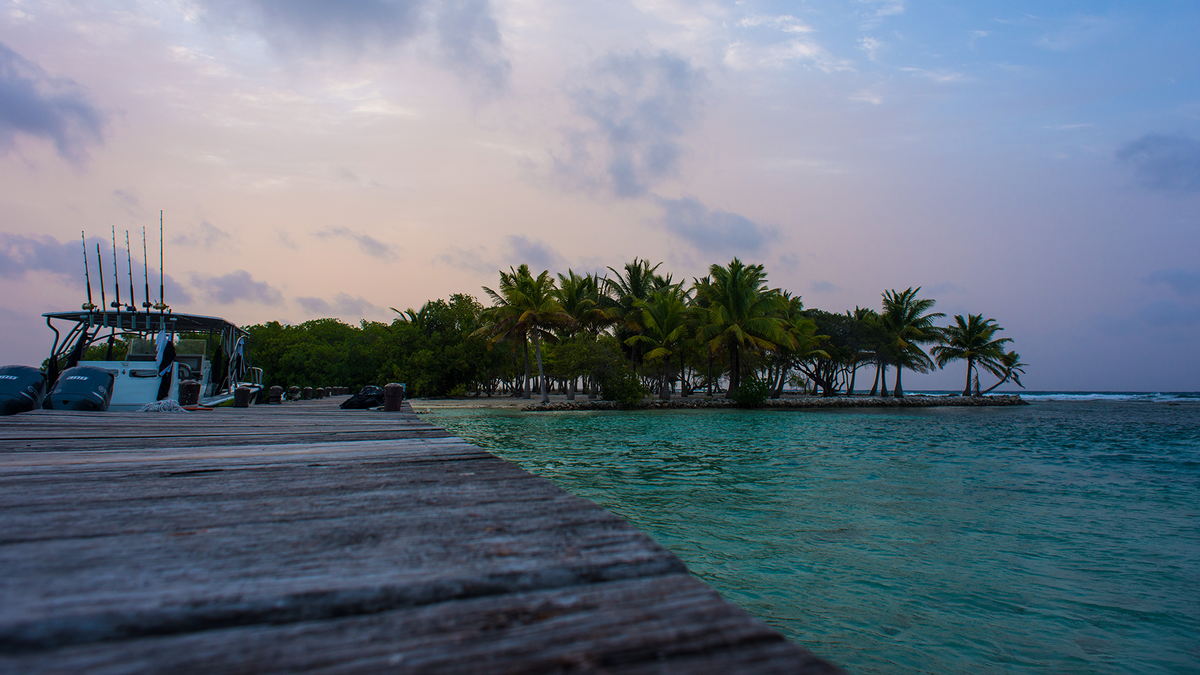
I yearn to spend time in a remote location, preferably by the ocean, away from all the daily commodities and luxuries we have grown so dependent upon. Regrettably, even addicted to it. Yet, there is also an uneasiness as I distance myself from the comforts of home.
I believe that our urban lives, so filled with comfort and immediate, yet temporary satisfactions, take a slow, persistent and cumulative toll on our consciousness, on our more profound needs.
We have struggled to design every process, product and service so as to deliver the effortless and instantaneous reward, leaving us oh-so-marvelled at their ingeniousness and utility. We have subsequently failed to realize the true cost of their deceptive practicality. An actual price that is not measured with money but in a much higher form. The progressive disassociation of ourselves from nature, and in that process, from our primal instincts and actual needs.
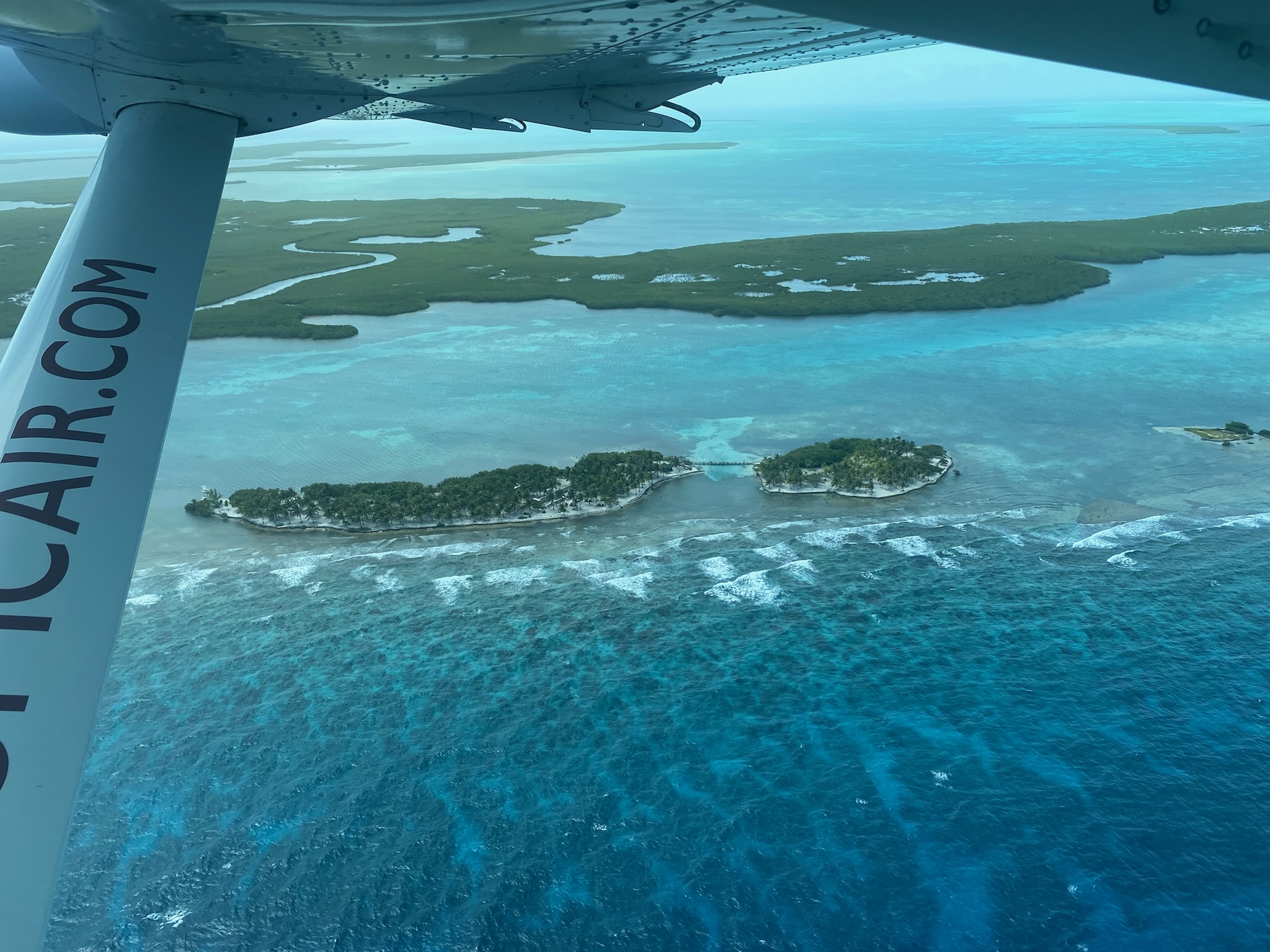
Before I fall any further into this rabbit hole, I wish to share a camping experience with you on a beautiful small island that is part of the Turneffe Atoll in the Belizean Caribbean. Turneffe Atoll is some 20 miles off the coast of Belize, just far enough to lose all internet and cellphone service. The atoll comprises around 150 small islands and significant extensions of pristine mangroves that act as a nursery for all sorts of wildlife, including crocodiles, barracuda, snapper, stingrays, sharks, many species of birds, etc. The atoll is roughly 20 miles long by 10 miles wide and is surrounded by deep drop-offs that make for some world-class diving.

Our group consisted of 5 married couples, most of us in our 40s, with kids, living regular urban lives in a mid-sized city in the heart of Mexico. Adriana and Jose Alberto, the couple that invited everybody to this little adventure to celebrate Adriana’s 40th birthday, had been visiting this small paradise extract for many years now and have now come to know most of its treasures. Adriana and Jose Alberto regularly spend time away from the city but were a bit concerned about how the rest of us would fare with camping four nights on a mosquito-infested island, where more than one midnight walk to the loo house has been interrupted by some of the crocodiles that rule this still pristine corner of the Caribbean, giving the surprised camper reason enough to postpone nature’s most insistent calls.
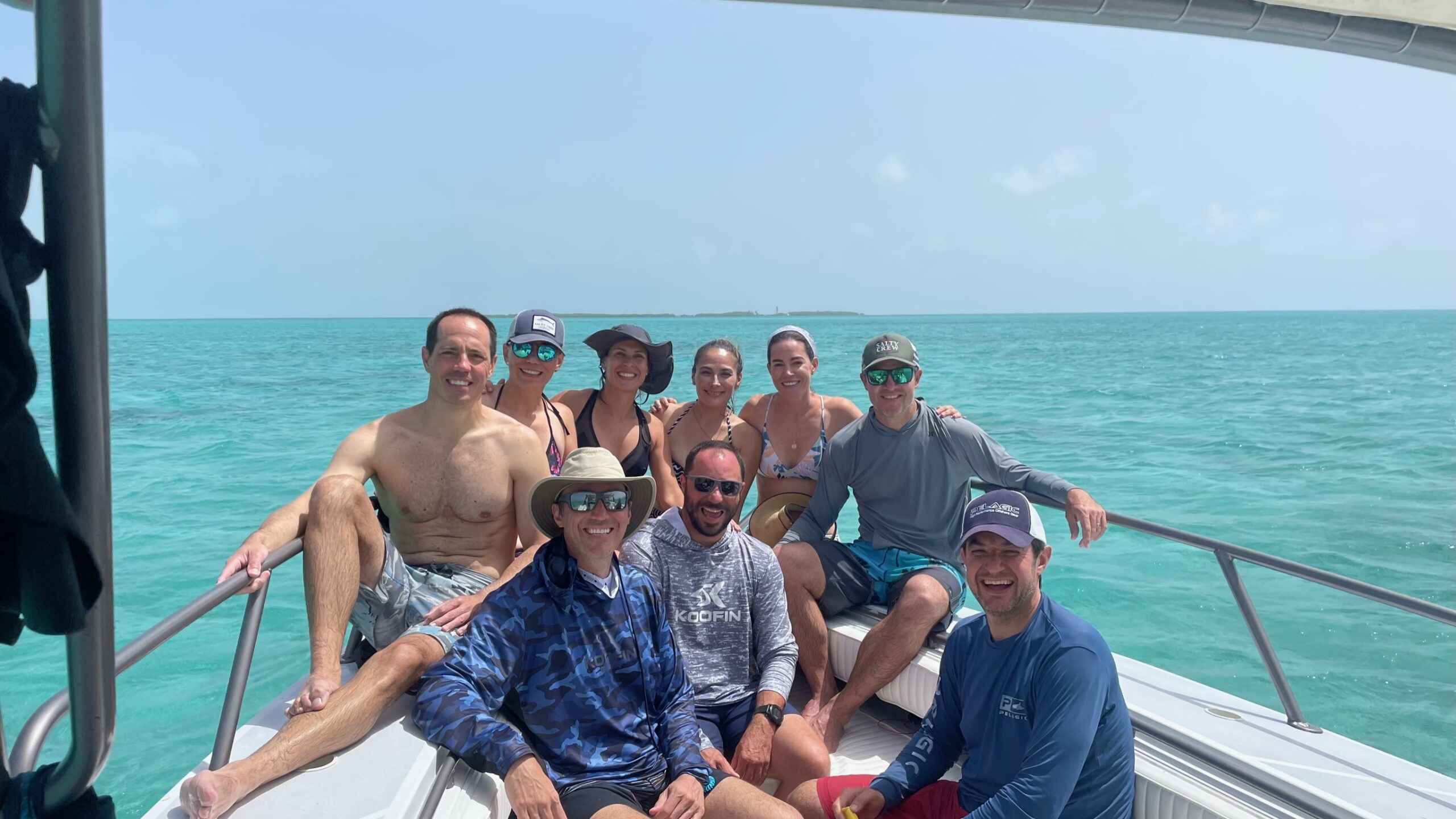
Before the trip, we met at different social events with Adriana´s and Jose Alberto’s family members. They told us stories about their experiences on this tiny Belizean island. Being aware of our urban-ridden lives and minimal wilderness experience, they told us to brace ourselves. We had heard all sorts of stories, from a boat almost capsizing in the middle of a storm with an entire family on board, crocodiles casually hanging outside tents, seeking refuge at a nearby lighthouse from massive thunderstorms. It had all seemed intimidating at times, but I couldn’t wait to experience as much of it as possible. My anticipation was such that I packed my bags a month before our trip.
“Viejo Lobo de Mar” (rough translation: “An Old Sea Wolf”)
The date finally arrived; we all met at the airport and took a plane to Chetumal, Quintana Roo; Mx. From there, we crossed the border into Belize by car, then drove to Corozal, where we boarded a charter plane for a brief, 30-minute, beautiful plane ride, flying over the crystal clear and turquoise-coloured waters of the Caribbean, to make the crossing onto Turneffe atoll. The sight of the coral reefs and islands from above was nothing less than breathtaking. The pilot was kind enough to give us a fly-over part of the atoll and flew right above our camping site and home for the next few days. The view was simply spectacular.
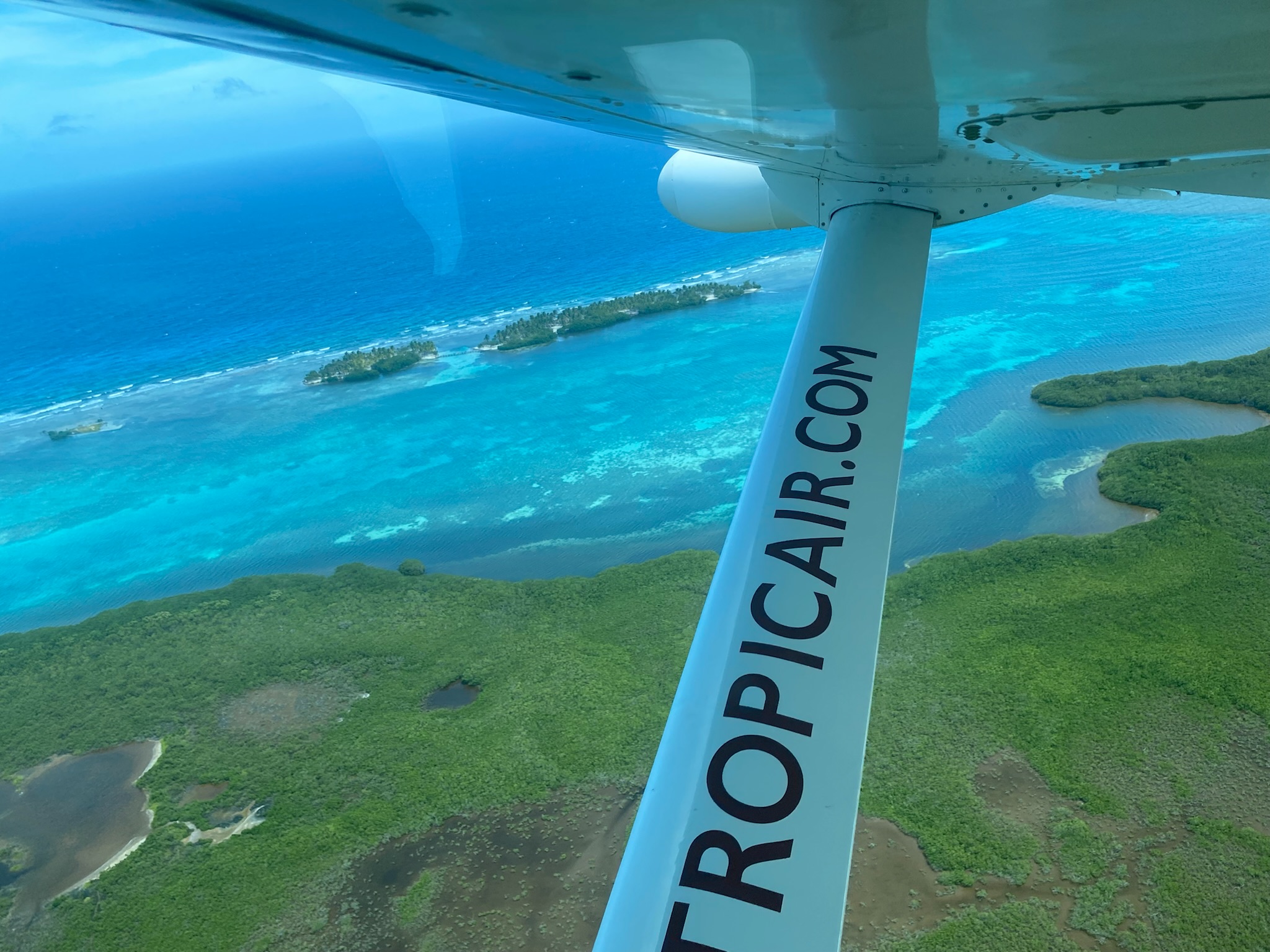
The mixture of the rich green from the mangroves and palms, contrasting with the light blues and turquoise colors of the shallow waters around the islands, then suddenly blending with the deep blue color that announces the steep drop-offs all along the eastern side of the atoll, made for a particularly stunning setting.
As the pilot made the final approach for landing on the very short dirt track where we had to land, he positioned the plane on a not-so-slight angle to counter the heavy easterly winds blowing that afternoon. As he set the plane down, he had to turn the wheel against the wind with full force to keep the aircraft on track. It reminded me of how a rally race car driver turns the wheel in the opposite direction of the curve to correct the course. I had never experienced a landing quite like it. It made for an exciting beginning of our time at Turneffe.
We were met on the ground by Eduardo, Dido and Carlos, Eduardo’s son and son-in-law, respectively. Aside from being our hosts, Eduardo would be our captain, and Carlitos and Dido would be our divemasters for the length of our stay. Eduardo is what we would call in Spanish un “Viejo Lobo de Mar” (rough translation: “An Old Sea Wolf”). A consummated diver and overall seaman who knows the waters along the atoll better than most of us will ever know our own homes. We were in good hands.

Eduardo and his family have been hosting Adriana’s and Jose Alberto’s family on their Belizean adventures for decades now, and they have become an essential part of each other’s families.
"Everything I had been dreaming of and more, a lot more"
As soon as we landed, we started unloading dozens of gear bags and suitcases. Before loading them onto a makeshift truck, we headed to the pier, only a couple of hundred yards away from the airstrip to board “La Reina”, a beautiful 40 ft boat powered by a couple of 300 hp Yamaha outboard engines which would take us to our campsite and would be our means of transport to reach all the incredible dive spots for the following days.
The 30-minute boat ride to our campsite gave us a small taste of what would follow. We continued to take in all the scenery’s beauty, now contemplated from ground level, instead of the bird’s eye view we had been given as the plane made its final approach.
However beautiful the views en route to our campsite, they were no match for the vista when we reached our destination. Two small islands connected by a small wooden bridge, entirely covered by palm trees and mangroves, complemented by a tiny white-sand cove that merged perfectly with the blue and green tones of the shallows surrounding the islands.
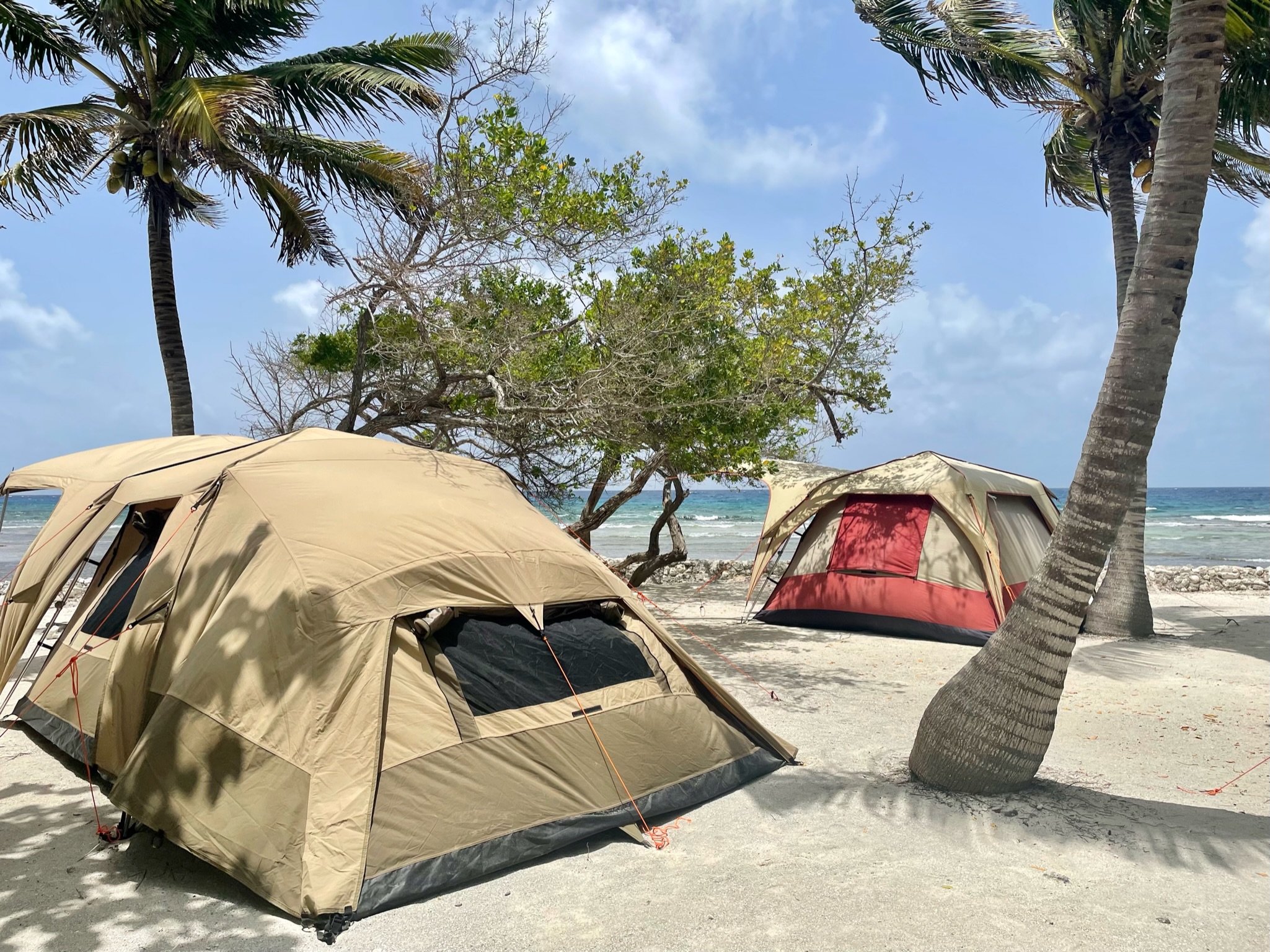
My wife and the rest of the girls went ahead to choose whichever camping tent they fancied. Meanwhile, the rest of us unloaded the hundreds of pounds of gear and suitcases from the boat. After grabbing our bags, I headed over to meet my wife by our camping tent. I still remember the smile as I reached our tiny refuge. My wife couldn’t help but laugh as she saw my reaction. She knew it was everything I had been dreaming of and more, a lot more. Our tent was set up no more than 15 ft from the ocean. The setting was simply perfect. Although this was not exactly the exotic trip my wife had in mind to celebrate our 15th anniversary, I was one happy camper.
I could have stayed the rest of the day just contemplating the view from my tent. But it was close to 5 pm, and if we intended to have any dinner aside from rice and beans, we had to get it ourselves. This was nothing close to a survival situation, but we had to catch our own fish if we intended to get a decent protein-based meal. So, Eduardo, our captain, fired up “La Reina” again, and we all got our gear set up and ready to go for a dive.
One of my biggest passions in life is spearfishing, which for those not familiar with the term consists of diving down, on a single breath of air to hunt fish with a speargun or polespear, and managing this feat while holding your breath throughout the entire hunt.

My friends had decided to go scuba diving, but I was determined to get some dinner. So, I asked Eduardo to drop me off a few meters away from the divers so I could try to catch some food. As I jumped in the water after all the scuba divers had made their descent, I realised that this was not an exceptionally shallow spot. My dive computer had failed on me, so I had no way of knowing exactly how deep it was, but, from experience, I was guessing around 80 ft deep.
A few minutes passed, and I hadn't spotted any decent fish, but I did see a couple of good-sized triggerfish swimming in mid-water. They started swimming deeper and away from me, but by keeping my approach as relaxed and non-threatening as possible, I could close the gap a few feet before reaching the bottom. I slowly extended my speargun, took a quick aim and pulled the trigger. It was a good holding shot, giving me a momentary relief. That is until, drawn by the commotion of the struggling fish at the end of my shaft, a large school of mid-sized to quite large Cubera snappers showed up. Quite literally, out of the blue. I kept looking at my, in comparison, minuscule catch and my unloaded speargun, and then looking back at the massive Cuberas only 5 feet away, back at my triggerfish and back again to the Cuberas, and again, triggerfish, Cuberas. All the while draining my oxygen supply and cursing myself for allowing my food anxiety and insecurities to get the best of me. I finally headed to the surface in a hurry to hand the fish to the boat’s crew and try to reload as quickly as possible.
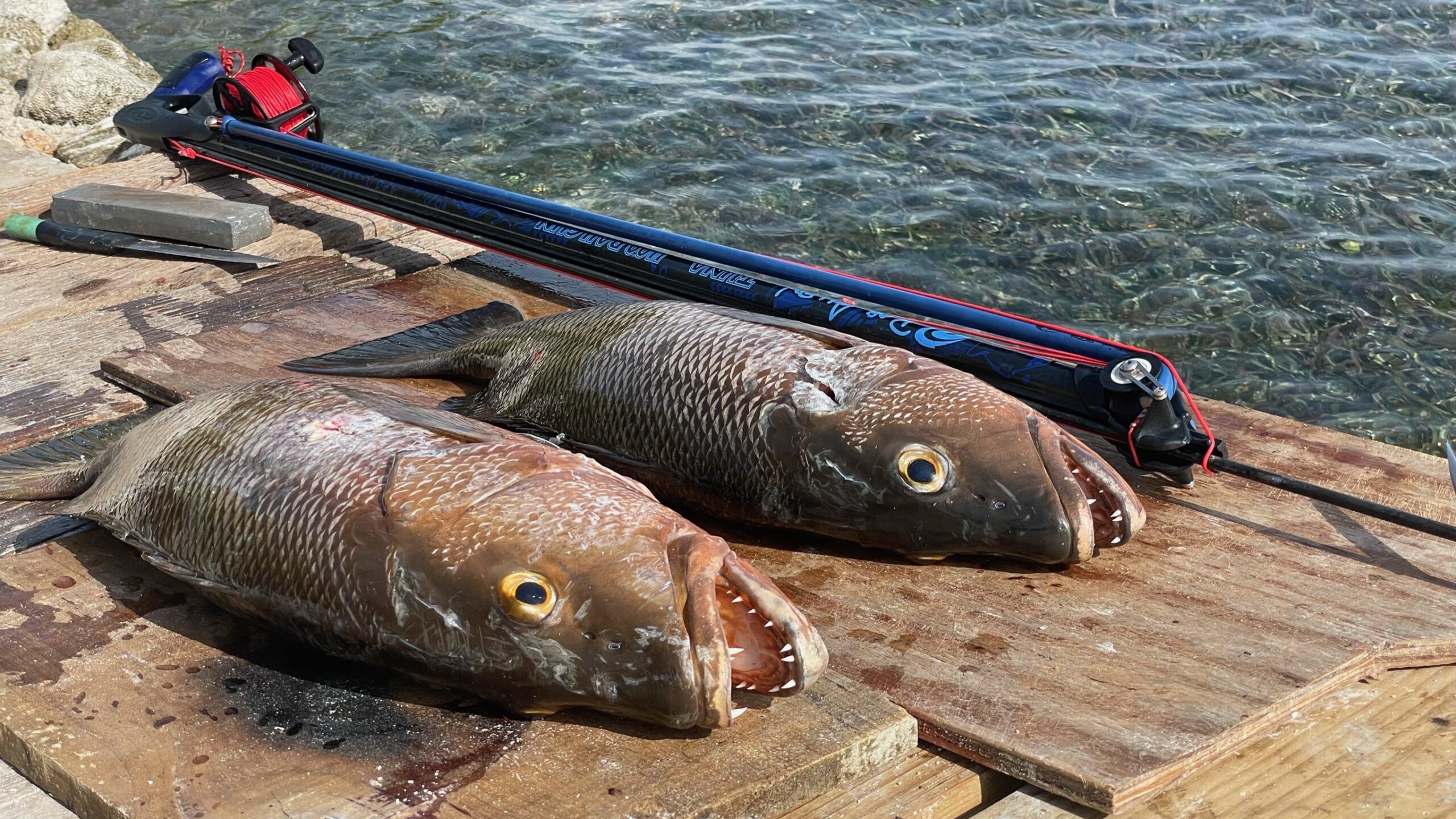
"Every cell in your body screams for oxygen"
After a few minutes of searching from the surface, I finally spotted a few Cuberas. I made my best effort to calm myself, knowing I only had one more opportunity. As I began my descent, I focused on making very slow movements, making my kick cycle slower than usual. I knew the Cuberas would not be as curious as on the first dive and would be much more cautious. I needed to appear as non-threatening as possible if I had the intention of landing one. I made a conscious effort to dive all the way to the bottom without making eye contact with any of the fish. Eye contact in the ocean is regularly interpreted as threatening, so it is best to avoid staring down your intended prey. As I reached the sandy bottom, I very slowly positioned myself parallel to the drop-off, as stealthily as I could. I slowly turned my head, and there was a single Cubera snapper a few feet in front of me. None of the larger fish seemed to be around, so I slowly extended my speargun a few inches in front of the direction the fish was swimming in. My oxygen supply fading as each second passed. Slowly, the fish closed the gap. I took the shot and connected to my target. Securing my fish and headed back for air. I was done for the day. The Cubera was a very nice-sized fish that together with the triggerfish would feed us that night beyond satisfaction having been brilliantly prepared by Eduardo and his family.

One of the many reasons I enjoy freediving and spearfishing so much is that it demands your total attention and presence. As you descend on a single breath of air, your body begins going through many radical changes and adaptations as the “mammalian diving reflex” activates within us, causing all sorts of reactions within our body. These include “bradycardia” which means our heartbeat slows down considerably, so our bodies consume less oxygen. It also reduces the blood flow to extremities and other non-essential organs and concentrates the blood flow primarily to vital organs. Breath-hold diving demands you to be completely present at the moment. It has a way of centring you, by driving your focus to that moment and that moment alone. It also offers the maximum sense of freedom I have ever experienced. To be able to rid your body, however momentarily, from the urge to breathe, is an incredibly liberating and empowering feeling. It is also tremendously peaceful, at least until the contractions begin to manifest. Contractions are the involuntary movements of your diaphragm and intercostal muscles that contract as the CO2 builds up within your body as it consumes and metabolizes the finite amount of oxygen in your system. It gets to the point where you feel like every cell in your body screams for oxygen. It is a tremendously difficult urge to contain and a dangerous one. If you overdo it, your brain shuts off, in a defence mechanism designed to prevent brain damage due to acute hypoxia. It causes you to faint underwater. Definitely, not your ideal situation. It doesn’t get much more primal than that.
It is fascinatingly difficult to hunt underwater, but I will just mention a few of the variables that come into play when spearfishing: water visibility, water temperature, currents, wind force, tides, moon phases, weather, gear issues, time of day, not to mention your own physical and mental state. They all play a considerable role in spearfishing. More often than not, one or more of these will tip the scale in favor of our intended targets, greatly diminishing your odds of a successful hunt.
The practice of hunting our own food has become not only frowned upon but anathema"
For reasons beyond my comprehension, to a large group of people in our society, the practice of hunting our own food has become not only frowned upon but anathema. Most of us feel no guilt in heading over to our nearest restaurant or supermarket to purchase whichever dish we fancy, with complete disregard about where the food we so conveniently purchased inside some air-conditioned megastructure, comes from. Whether it was sustainably caught, humanely killed or, in the case of seafood, even about what species we are actually consuming. According to reports by Oceana and other specialized sources on the matter of seafood fraud, between 25% to 70% of seafood products, are mislabeled.
The case of fisheries is an additional dark element in the entrails of the industry. As Ian Urbina has masterly portrayed in his book 'The Outlaw Ocean', in order for the fish that we purchase at restaurants or supermarkets to comply with the freshness and price point we have come to expect and demand, some within the industry have turned to modern-day slave labor. To keep the costs down and accommodate the expectations of its uninformed customers, we have turned into unwitting accomplices.

It is mind-boggling that those who immerse themselves into nature, to responsibly and legally hunt their own food are labelled as barbaric. Yet those that label seem to have no problem with completely disregarding these well-documented dark facts about our global food industry. It is instead terribly convenient to source their protein needs from perfectly packaged sachets.
Fortunately, none in our party share those views about hunting for our own food. Quite the opposite, we all value and appreciate our day’s catch, and despite the extra-long day and how tired we all were, we took the time to enjoy our well-deserved and deliciously prepared dinner, while sharing in the beauty of our majestic surroundings.
Eventually, with a little regret, we headed to our tents for the night. As my wife and I lay down to rest, I took a moment to acknowledge the sense of bliss created by the sound of the ocean splashing onto the very shallow reef just a few feet from our tent. The sound of the wind combined with that of the ocean composed the ideal lullaby for a perfect night’s sleep. I have a bad habit of drinking too much water during the night. So, every night, no matter how deep my sleep, I need to interrupt my rest and head to the bathroom. As I exited the comfort of our camping tent, I noticed the thunderstorm pounding the southern part of the atoll. The storm extended to the east and menacingly headed our way. I couldn’t help but wonder how our tents would hold their ground against such a powerful foe. But for now, all I could do was admire the view for a few moments and then head back to sleep, hoping the storm would spare our small retreat. As luck would find, the storm evaded us completely.
"The lack of constant interruptions from digital notifications"
The following morning, I woke up early in hope that the wind had died down so that I could do a shore dive and catch some more fish. Unfortunately, that was not the case. The constant force of the wind on the ocean had made for quite choppy seas on the eastern side of the island. The only way I could get out on the reef would be by boat. As beautiful as the palm-laden island were, it took a lot of resignation and self-restraint on my part to not make a futile attempt to swim out on my own. For me, being by the ocean and not being immersed in it, exploring what lies beneath its surface is, well, painful. Whenever I am looking out at the ocean it just screams at me to go and take a peek. This feeling quickly transforms into a never-ending need to see what lies just beyond the edge of whatever the water visibility allows me to contemplate on that particular day. But I guess age has a few benefits and prudence seems to be one of those few. It was with my newly found prudence, and a certain amount of resignation, that I laid back and allowed myself just to take it all in. The sound of the wind on the palm trees and ocean, the sound of the waves on the shallow reef along the island, the immaculate colors of the Caribbean and best of all, the lack of constant interruptions from digital notifications from our communication devices.

Everybody soon began waking up, and we gathered for breakfast to accumulate the necessary calories for all the day’s activities. Upon finishing breakfast, some of my friends began asking for ways to contact home. There was palpable anxiety from being largely cut off and uncommunicated. So out came the Garmin Inreach to send some prying texts about the state of our children back home.
The priority for today was to harvest some fish for lunch and dinner. So, we headed out to harvest what we needed from the ocean to feed ourselves. During the day’s spearing session, Jose Alberto, Adriana, Jose and Daniel all caught some amazing fish.
After securing our ocean-based protein stocks, we proceeded to enjoy the beautiful underwater sights presented by the pristine coral reefs along the atoll. I must say I was quite impressed by the beauty and apparent overall health of the coral formations we had a chance to dive at. Colorful sponges and corals abounded. Reef fish were plentiful, and I didn’t notice any widespread bleaching in the corals as is evident in so many other spots I have had the pleasure of diving at. One of the highlights was a large green moray eel we encountered swimming completely out of its crevice and directly onto my camera’s dome. It is not very common to see moray eels swimming that way, at least not during the daytime.
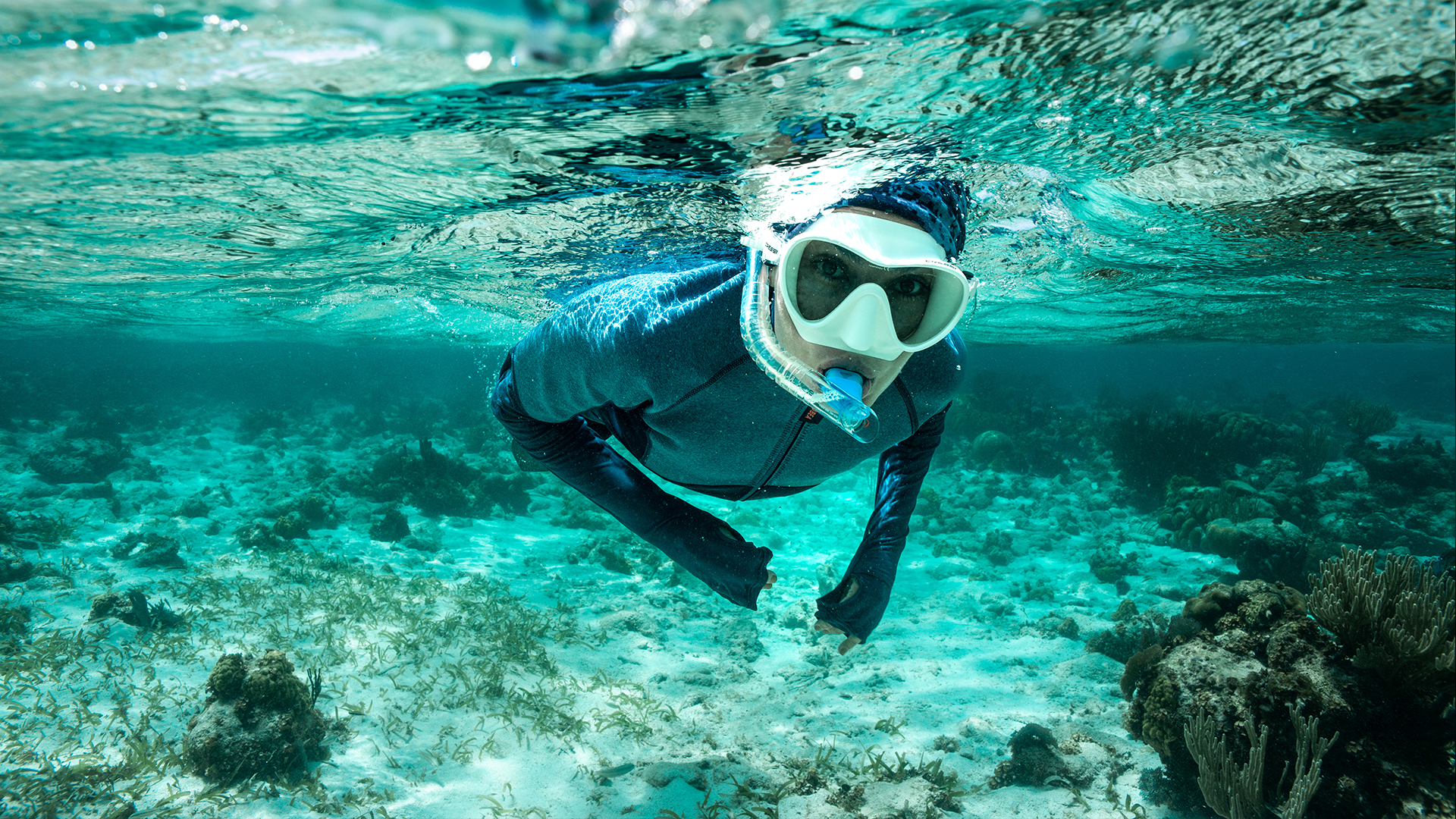
After the morning dive, we headed back to the island to get some pink conch ceviche. This is, by far, my favorite type of ceviche. The perfectly white-colored meat with an almost crunchy consistency and complete lack of any harsh seafood taste makes up for a delightful experience on your palate. It also brought back very fond memories of my early childhood growing up in Cozumel, Mexico, where, unfortunately, although once plentiful, this oceanic delicacy has now been heavily overfished.
We had planned for another dive later that day, but for now, we had some time to enjoy the natural amenities all around us. As I mentioned, I can’t stand at the ocean’s edge for too long. The need to gaze at what lies beneath simply takes over me. In order to put this uneasiness to rest, I quickly put on my mask and fins and went for a snorkel session by the pier that connects the two islands. Before long, I discovered this little inlet would become my favorite spot on the island. Just beneath the pier swim schools of mangrove snappers, yellowtail snappers, juvenile triggerfish, all kinds of parrotfish, a few juvenile lionfish, and a bunch of baby barracudas. Lobsters also inhabit the crevices on the rocks beneath the pier. On the mangrove side of the pier, some large stingrays and even a very shy spotted eagle ray make some unannounced appearances throughout the day. Over the next few days, I would spend a good amount of time doing my best to earn that eagle ray's trust in order to snap a few close-ups of its beautiful white spotted pattern against its black background. However, no matter how much I tried, I wasn’t able to get it to trust me enough to get the shot I wanted. I think I was trying too hard, being a bit too eager. I should know better from my spearfishing experience. Most of the time, in the water, if you want to get close to an animal, you need to appear as uninterested as possible. You want to arouse their curiosity and have them want to come to you. Trying to chase fish (or rays) in the water is completely futile.
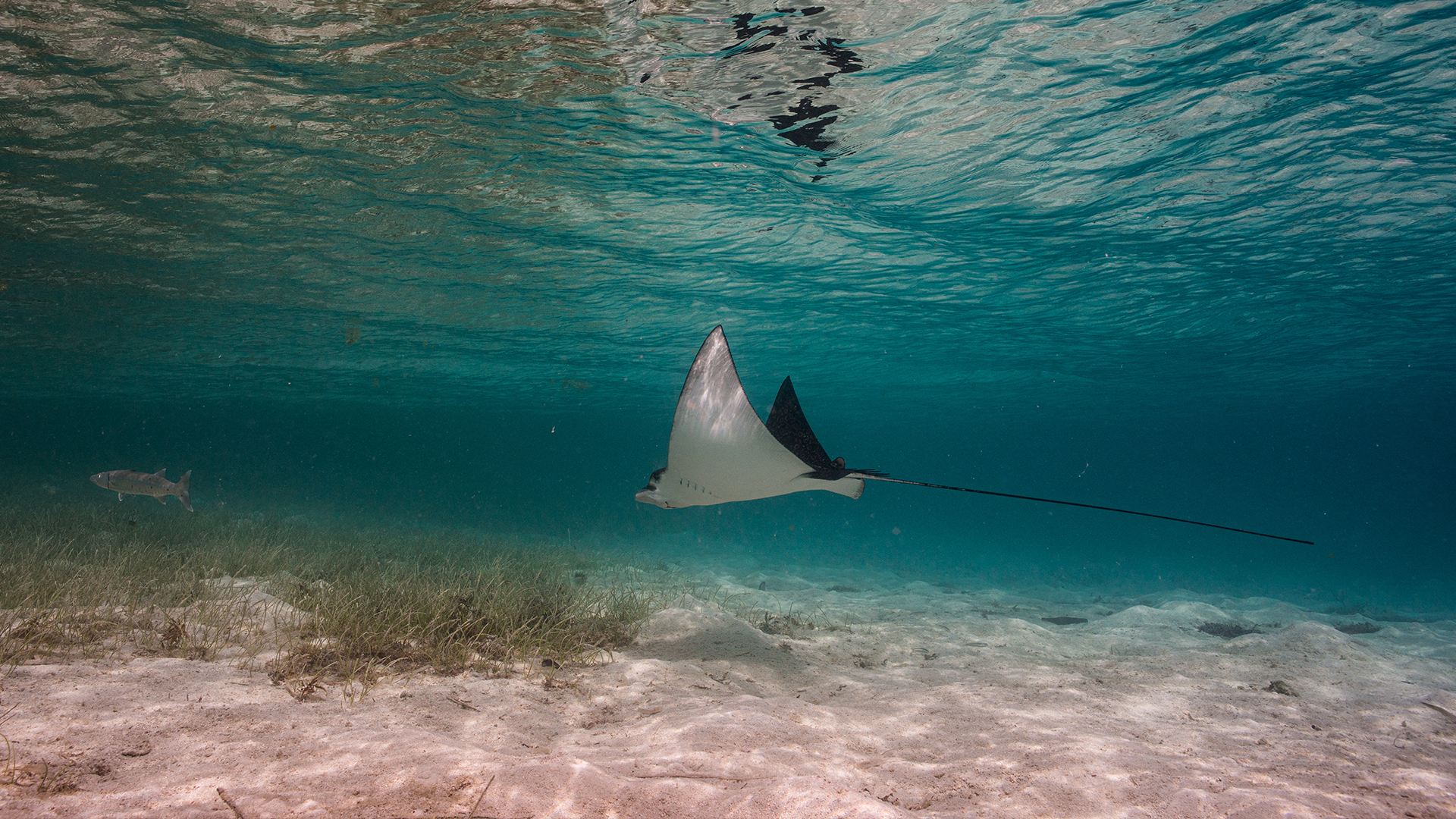
Eventually, it was time to head out for our evening dive at another spectacular spot. As we went through with our dive under the watchful eye of Dido and Carlos, I was again taken aback by the colors, coral formations and overall sealife we encountered. Ever since I discovered freediving, I have lost a bit of the love I had for scuba, but frankly, every single dive we made throughout our visit, was jaw-dropping. I didn’t expect the diving to be that good. It was a very welcome surprise for me.
"Humans have an innate desire to connect with nature and its life forms"
We returned to the island to enjoy our day’s catch. A feast of Cubera snapper and grouper would be our main courses for the evening. Eduardo and his crew certainly know how to cook fish. Thanks to them, we feasted on another delightful dinner with great food and even better company. As the days progressed, I couldn’t help but notice that no one was asking for the Inreach to text back home anymore. Another noticeable change was that our conversations tended to stray further from our urban lives and preoccupations and drifted more and more around the fantastic interactions with wildlife and nature we were experiencing throughout our trip. No doubt this situation was partly brought about by the fact that we became more disconnected from artificial stimuli every day and gradually achieved a deeper connection with our natural surroundings.
Upon reading Steven Rinella’s latest book, “Outdoor Kids in an Inside World", I recently became familiar with a term and thesis put forth by an American biologist by the name of E. O. Wilson. The term is “biophilia”, and its hypothesis states that humans have an innate desire to connect with nature and its life forms. I had never heard of this term before, but as I read about it, I immediately identified with its premise. At least in my case, I feel a deep desire to connect with nature in general, but particularly with large wild animals, large ocean-dwelling creatures, and above all, with sharks. It goes beyond a desire; it is a need, a calling of sorts. I, for one, believe that this “biophilia” lives in all of us. We have just learned to turn off this call of nature throughout our progressive alienization of nature. However, it doesn’t take much for us to be able to heed the call again. Small interactions with mother nature are all that is required for that yearning to awaken within us. Let us seek out those interactions; they are good for the soul.

After lunch, Jose Alberto decided to do some kite surfing. I wanted to try my luck taking some photos of his kite surfing sessions. It was quite a challenge to get some decent photos with a 20 mm lens on a full-frame camera, but I was determined to get at least one good shot, especially since I knew my eagle ray photos would come up short.
"Deep sleep is another pivotal benefit of drastically reducing our screen time and substituting it with real experiences in nature."
Later we would take a walk crossing the very shallow channel to the next island, located only a couple hundred yards north of our tropical haven. Walking between the islands, we saw the bonefish feeding in the shallows. These fish bring in more than a few flyfishing enthusiasts to the atoll. Eventually, the sun began to set, and we moved to the island's south side, which is the best place to enjoy the very particular sunsets you can observe in Turneffe atoll. I had never seen a sunset like the ones we got to experience there. The sun took a very bright, whiteish color as it set over the horizon while surrounded by a strange haze that gave it a bit of a weird, end-of-days kind of feel. This would become part of our daily routine over our brief but unforgettable stay on the island. Not even the swarms of mosquitoes could ruin these moments.
After sunset, we would regularly head to the dining area, consisting of a large tent and a long rectangular wooden table with bunks on each side, that could easily accommodate us all. There we would enjoy many delicious meals, great conversations and even better stories about the early family trips to this Caribbean Eden, but overall, a lot of laughs.
The nights throughout our visit inevitably ended a bit early. The many consecutive activities we engaged in throughout the day took their toll on us. This night would be no different. Perhaps a bit too early, my wife, Maria and I, headed to bed. Maria suffers from chronic insomnia. It is not seldom a night that I find her staring at her phone at odd hours of the night as I make my regular nightly visits to the bathroom. One of our concerns was that camping on a deserted island away from the comfort of our bed would only worsen her chronic lack of sleep. Unbeknownst to us was that, during our time camping in Turneffe, she would enjoy deep and almost uninterrupted sleep night after night. Deep sleep is another pivotal benefit of drastically reducing our screen time and substituting it with authentic experiences in nature.

As night gave way to dawn, my restlessness forced me from my sleep. Just as I awoke, the scent of the sea cast its spell upon me again. There is no defence against this rapture of the deep. Then again, even if there were, I wouldn’t dare to take it. I am regularly not a morning person but being by the ocean has a notable energetic effect on me. It was just a bit past 5 AM, so I knew it would be a while until my friends woke up. I took this time to take a walk throughout the islands whilst taking some GoPro footage to try to capture some of the beautiful scenery and aid our memories to re-live a taste of Turneffe once we got back home.
The rest of the days would go about with basically the same activities. A spearing session for food collection, a couple of pleasure dives throughout the day, snorkelling sessions by the pier, island crossing through the shallows, mid-day ceviche breaks, sunset campfires, catch-of-the-day dinners and good laughs. Every dive spot brought about unique experiences. On one of the dives, the rest of the group had a remarkable encounter with a 500-pound Goliath Grouper. Unfortunately, these once abundant fish in these waters are now a rare sight due to overfishing. I had decided to skip the scuba session and follow the divers from the surface to practice my freediving. I still have a very clear image of Jose Alberto, making some excited arm gestures to signal the massive size of whatever he was looking at. The divers were, probably some 90 ft deep, taking turns to enter a cave in order to witness the rare find. He kept signalling me to dive down, but I was out of breath from chasing them from the surface. The current is usually stronger at the surface since there are no coral structures to cover the moving water column. By the time I finally caught my breath to make the dive down to the cave, the goliath grouper had already left its resting spot.

Another memorable experience was setting eyes on the sunken cannon Eduardo took us to marvel at. It lies in only about 3 feet of water, which I must say, rattles my brain as to how it ended up there. The entire area around its resting place is clearly too shallow for a battleship of any size to have been cruising in. I would love to get to know more of its story someday.
We also had a couple of special encounters with sea turtles. One was sleeping on the coral in about 50 feet of water, allowing us to marvel, and I must also say envy, its breath-holding abilities. The other encounter was with a turtle that was quite awake and decided to cruise by every one of us on one of our last dives. These perfectly adapted oceanic reptiles, display such grace as they propel themselves by flapping their front flippers through the water.
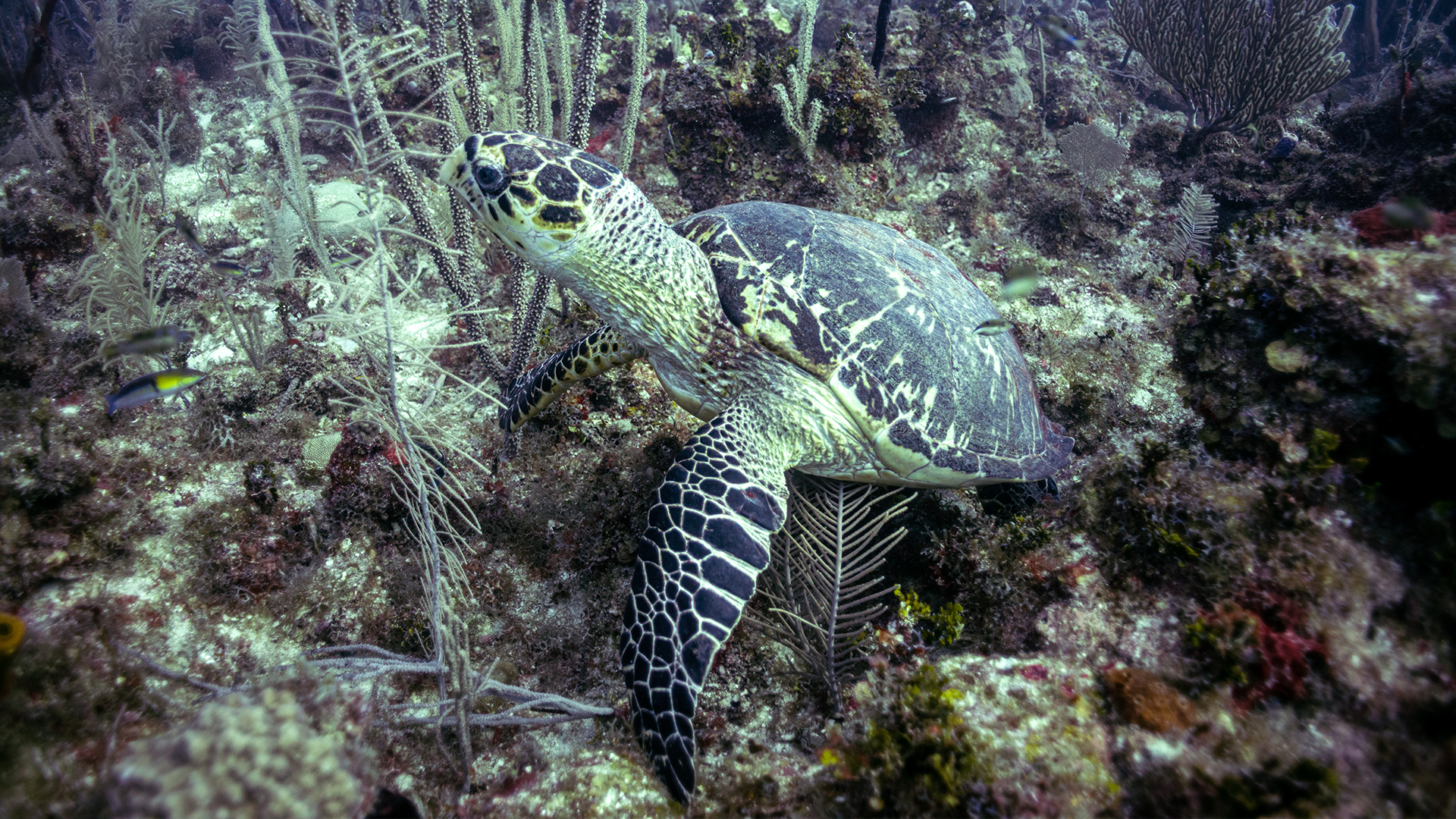
On our fourth day on the island, our little sunset routine got somewhat of an enhancement as we celebrated Adriana’s birthday amongst the most beautiful scenery. We all gathered by the wood fire and made toast after toast in honor of Adriana’s anniversary whilst feeling very fortunate and thankful to have been able to enjoy these unforgettable experiences.
"A big part of me wanted to strap myself to a palm tree in protest."
Another night went by, and even though we occasionally set out to search for crocs with powerful flashlights scanning the mangrove side of the island, we couldn’t spot a single one. Jose and I were quite keen on catching a brief glimpse of at least one. I think we would have been content with only spotting a couple of bright yellow eyes by the water's edge. But, regarding crocodile sightings, luck did not seem to be on our side. Our curiosity grew as the days went by. It got to the point that we decided to jump in a smaller boat, capable of navigating through the shallow passages within the mangroves and go snorkelling by the mangroves, hoping to encounter at least one toothy reptile.
Jose Alberto, Jose and I jumped in the very murky waters deep inside the mangrove labyrinth. Visibility was extremely limited. Probably no more than three or four feet, at best. At one of the spots, it was so bad, that we decided to move to another location. As we slowly swam through the very turbid waters, we scanned every inch below and around us with very heightened senses. Unfortunately, all we saw was a large cloud of silt that, at least in our imagination, indicated a large animal, very possibly our target reptile, had just swam off in a hurry, perhaps startled by our unwelcome presence. Eventually, we decided to hop back into the boat and head back to the island. Our encounter with this mighty reptile, ruler of the mangrove, will have to wait for another visit.

As with all good things in life, this fantastic experience would also come to an end. A big part of me wanted to strap myself to a palm tree in protest. I probably would have, if I had thought for a moment, it had any chance of extending our stay for a day or two. But we had to face it was time to leave this small tropical haven and get back to our busy schedules and hectic routines. Fortunately, we could take back with us all the wonderful memories we accumulated during our brief stay at La Gloria.
This was one of those trips that I will cherish for years and years to come. I would like to take this opportunity to thank Jose Alberto and Adriana for inviting us on this wonderful trip; I would also like to thank my wife for keeping an open mind about our radical change of plans for our anniversary. Also a big thank you to the rest of our friends who made it such an unforgettable experience and especially to Eduardo, Dido, Carlitos, Willy and Tupil for taking such good care of us in and out of the water during our stay in Belize.
Cover Photo: A view, just before sunrise, of our small Belizean paradise


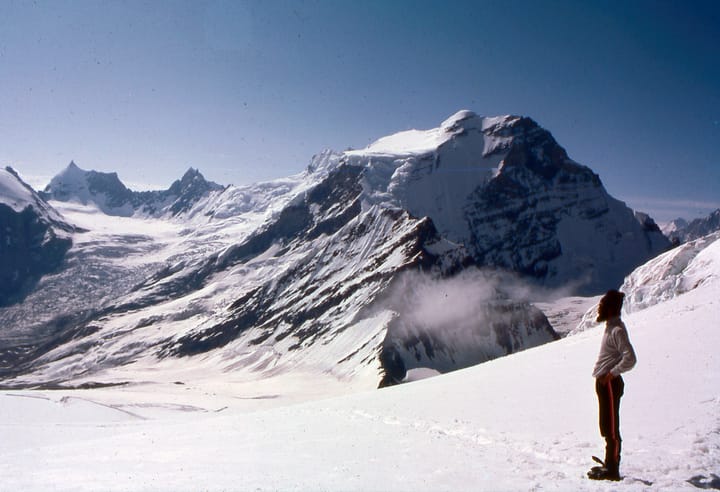
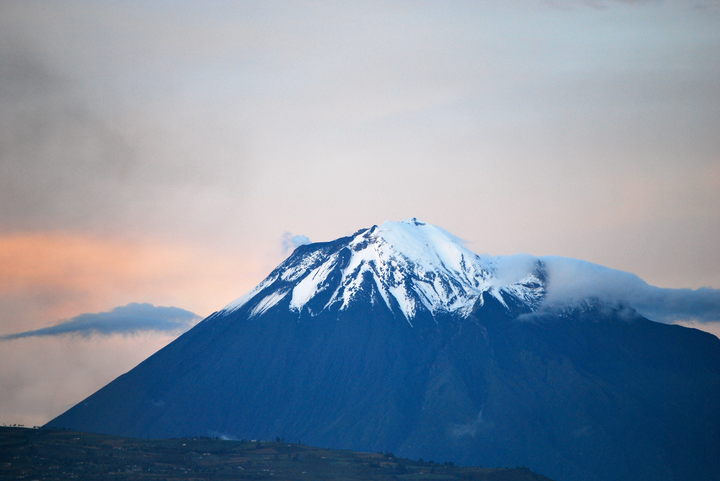
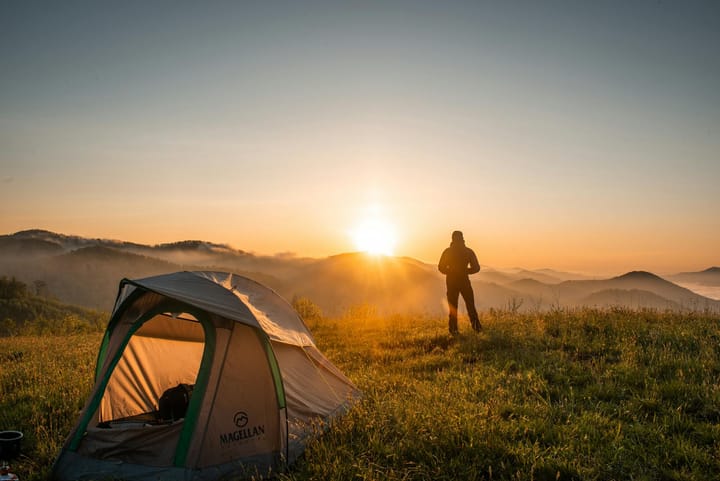
Comments ()